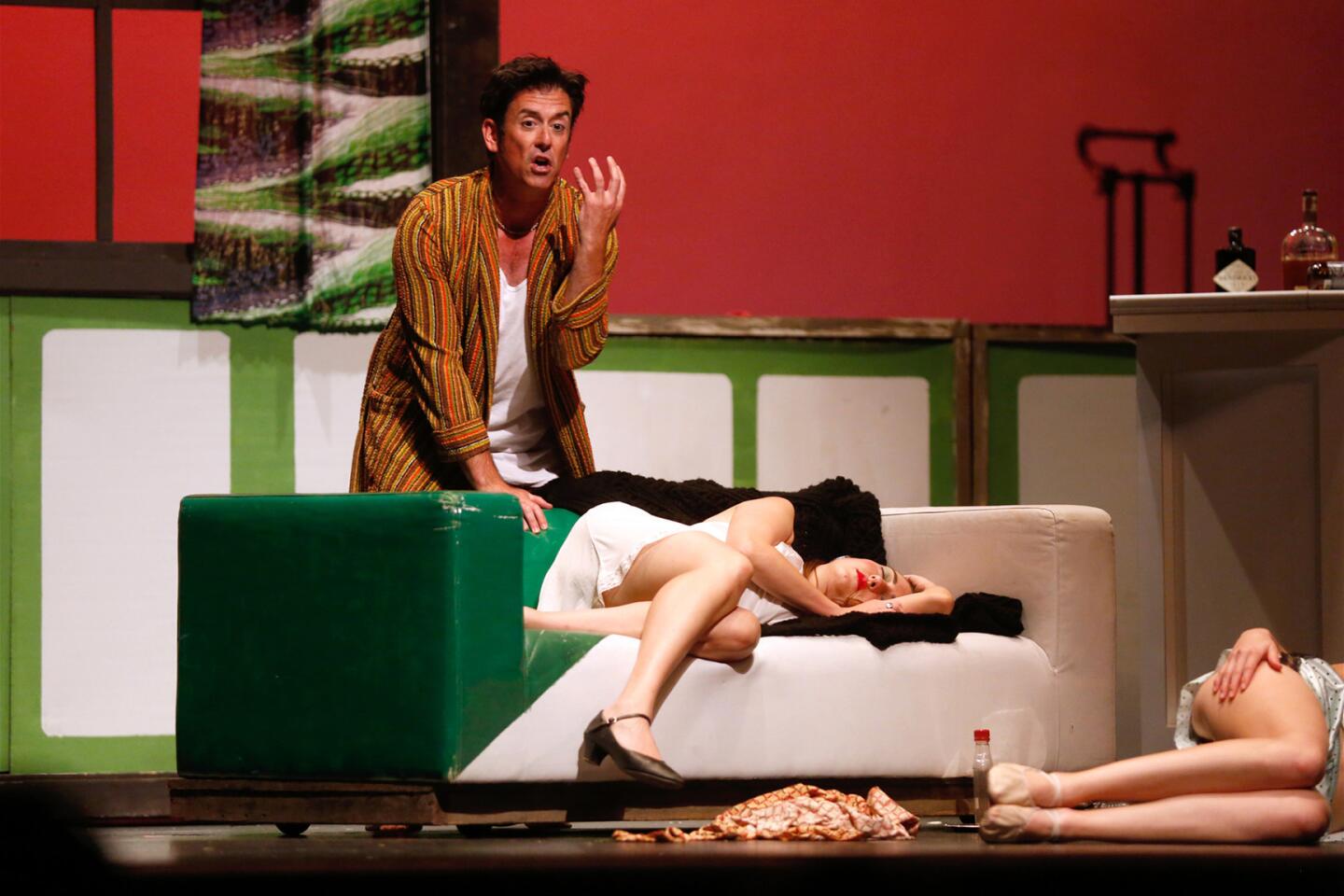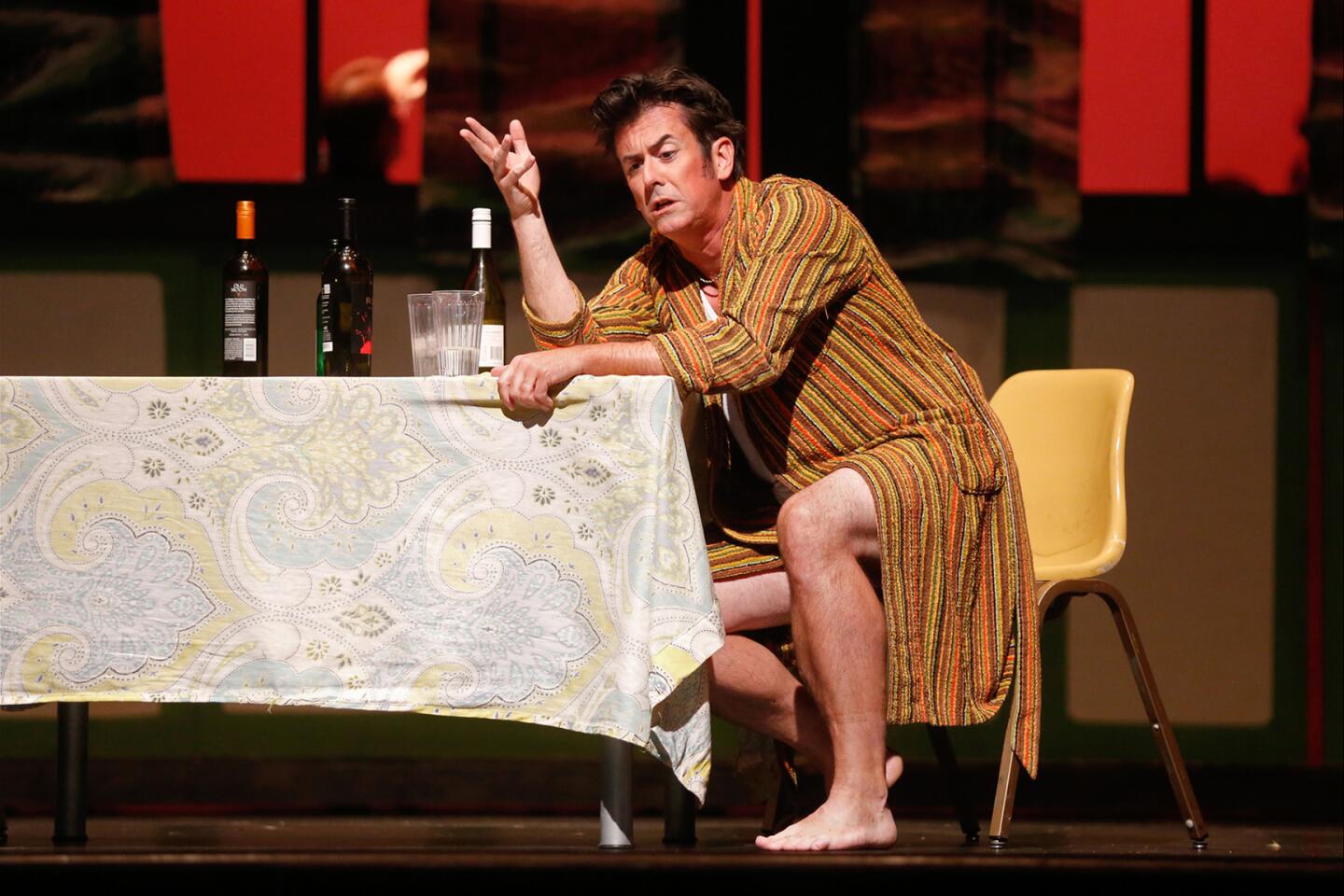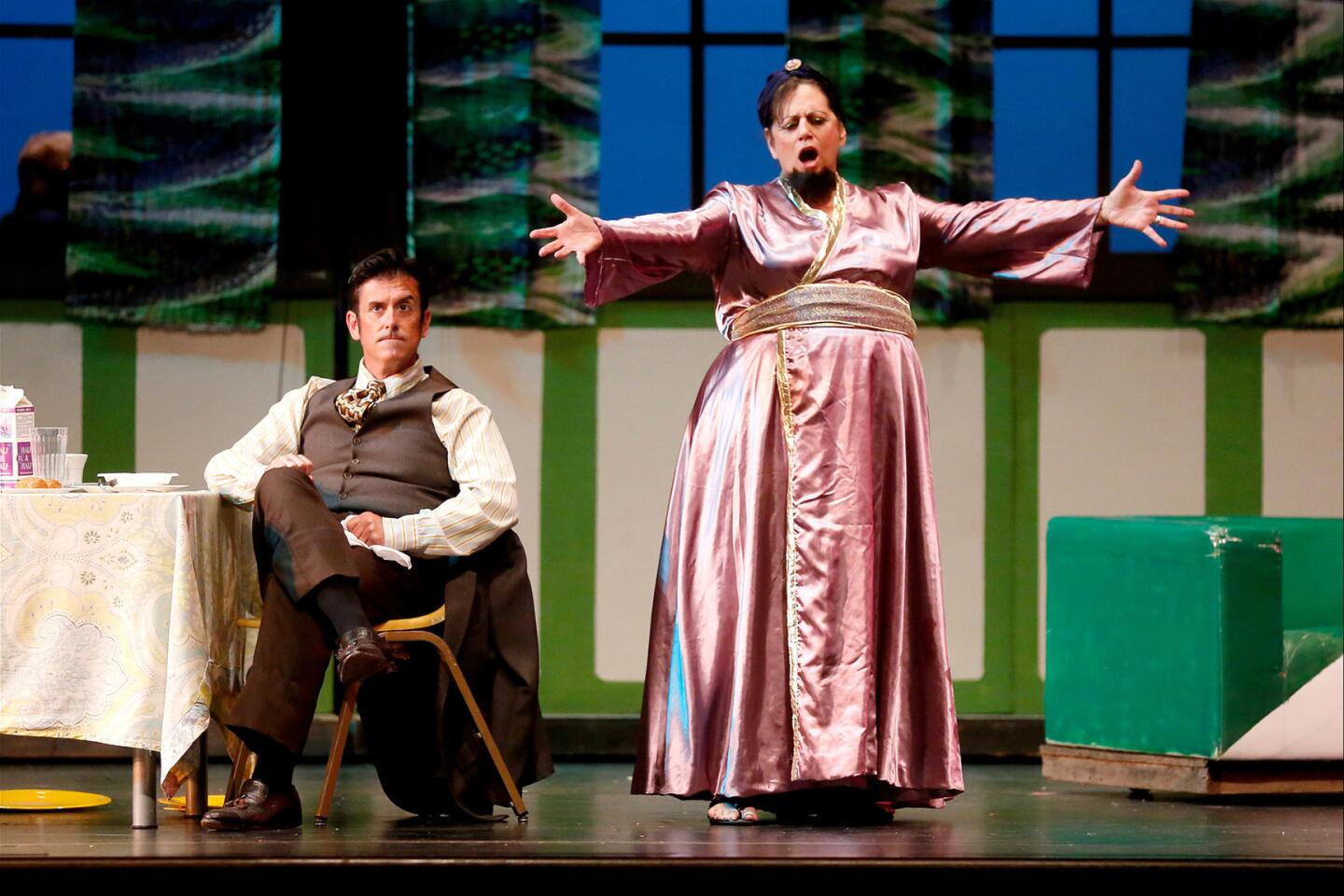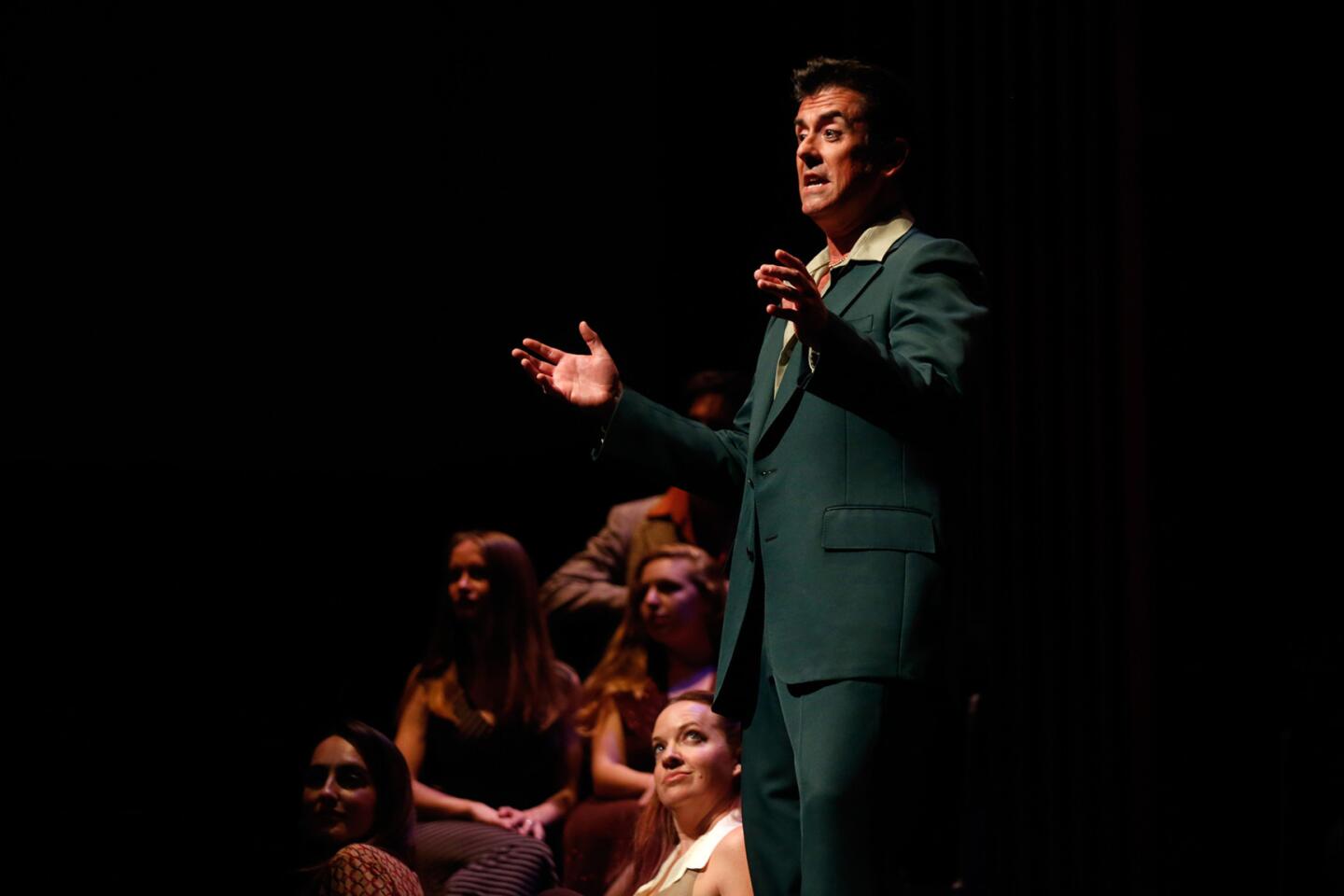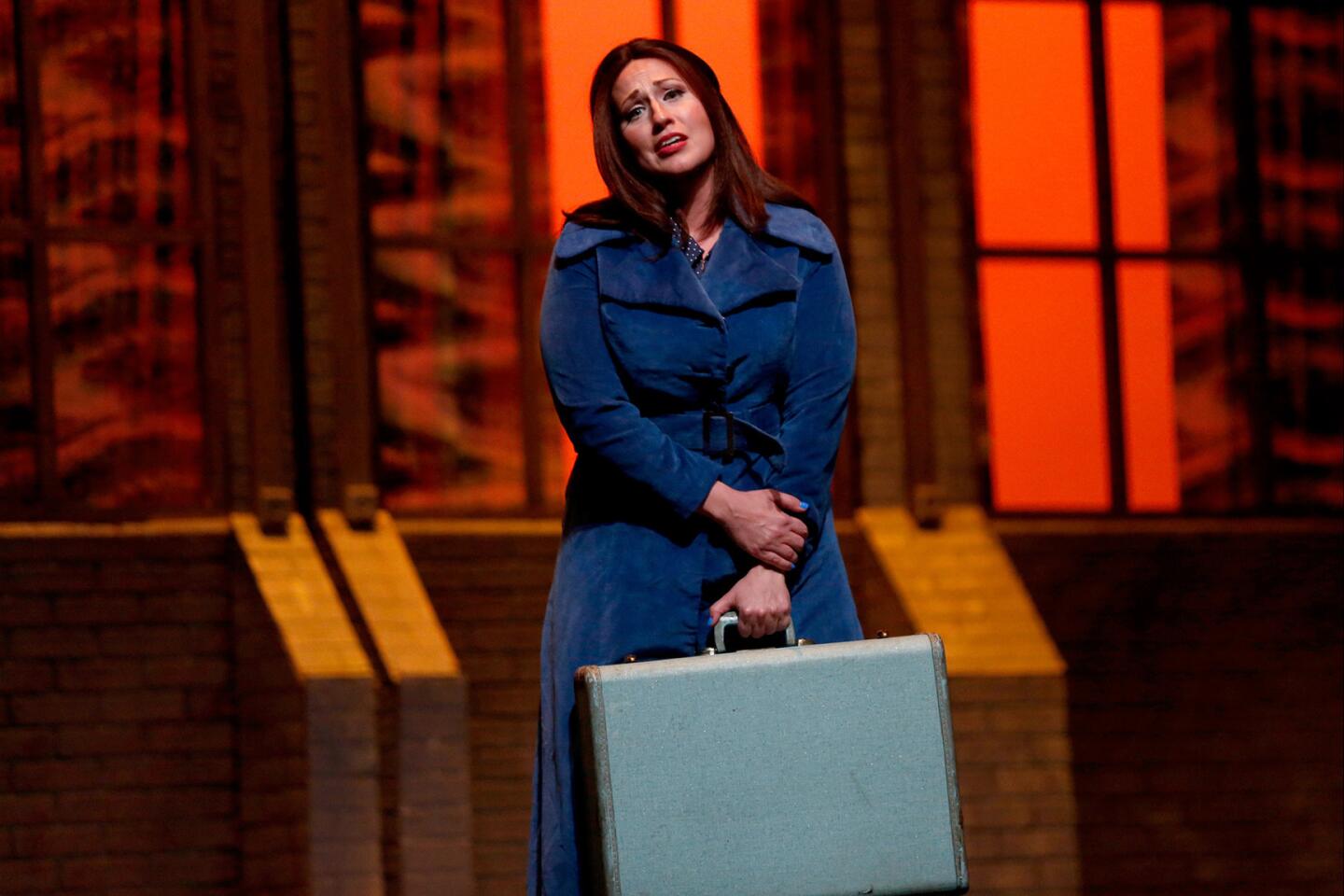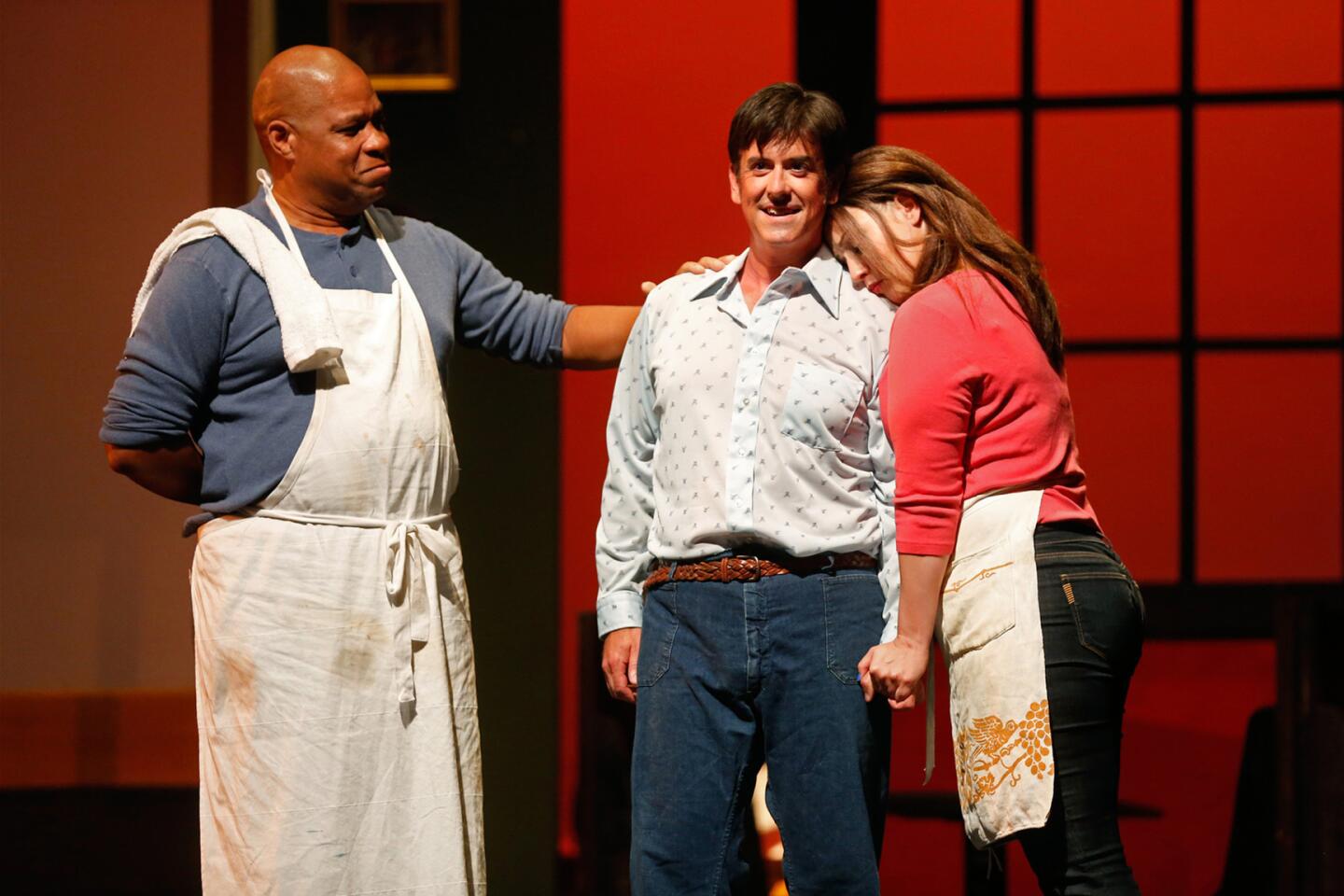Review: For opera lovers, at last a ‘Rake’ for L.A., bearded lady and all
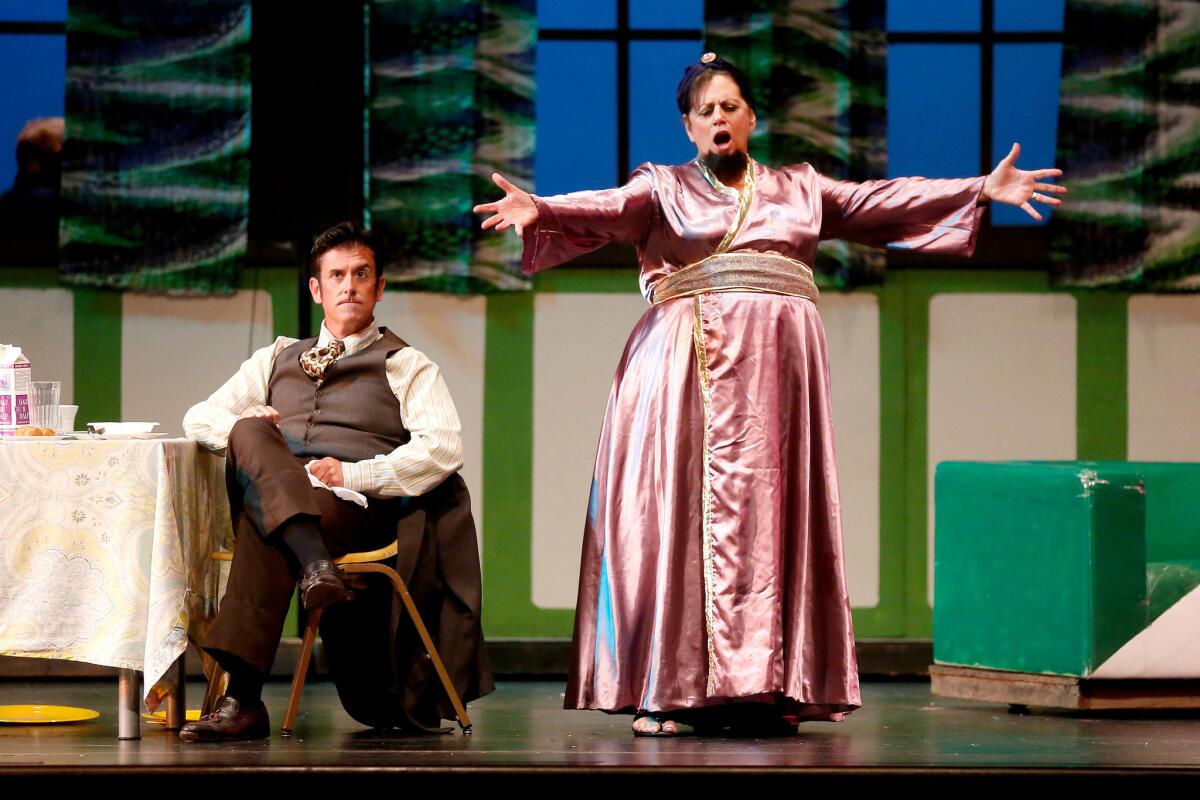
- Share via
Today’s opera quiz: Which two major opera librettos feature ladies with beards?
Angelenos should require no clues because by curious coincidence both found their way to local stages Saturday night. Verdi’s “Macbeth,” with its bearded witches, opened Los Angeles Opera’s latest season at the Music Center, while Baba the Turk in Stravinsky’s “The Rake’s Progress” could be found with her frilly white gown and dark patch on her chin in the latest offering from Pacific Opera Project. The POP “Rake” production at Occidental College’s Thorne Hall was repeated Sunday afternoon, making it possible to see both.
Actually, this is a trick question. Thanks to the witchery of L.A. Opera, darkened eyes and lips replaced facial hair in “Macbeth,” but the beard remained ever-present in “The Rake’s Progress.” Written by Stravinsky in the late 1940s when he lived in West Hollywood and now a repertory opera the world over, the “Rake” had never had a professional production by a company from Southern California until now.
Stravinsky’s opera has not been entirely neglected here. The L.A. premiere was a USC student production in 1961, a decade after Stravinsky conducted the world premiere in Venice. But this newspaper did not put out the welcome mat. “It would have been just as well to let a sleeping dog lie undisturbed,” advised Albert Goldberg, who never hesitated to pick a bone with L.A.’s most famous arts luminary of the time.
Other SoCal student productions followed over the years at San Fernando Valley State College (now Cal State Northridge), Cal State L.A., California Institute of the Arts and Music Academy of the West in Santa Barbara. Professional productions from San Francisco and Boston toured L.A. in the 1960s, both one-night stands. Another curiosity is that while serving as music directors of the Los Angeles Philharmonic, Alfred Wallenstein in 1953 and Esa-Pekka Salonen in 1996 conducted notable productions of the “Rake” overseas, but never at home.
So POP has made a little history. Not only did the engaging Sunday matinee offer a reminder of the inexplicable decision by Los Angeles Opera and Long Beach Opera to let this operatic sleeping dog lie, but in the process of meeting its toughest challenge yet, a scrappy young company has come of age.
POP’s MO is making opera casual. Most of its productions are at the Ebell Club in Highland Park. Ticket prices start at $20, and for not all that much more you get a table, wine and snacks. Young singers, with no place to hide, engage directly with the audience. There is a lot of humor. Everyone seems to know everyone. Production values are intentionally funky; the singing never is.
Few — aficionados or operatic newbies — leave dissatisfied.
Occasionally the company tries something more. It did an honorable, if effortful, job with Britten’s “The Turn of the Screw” at a downtown arts space. But last summer POP bit off more than it could chew attempting Verdi’s “Falstaff” at, of all places, the Forest Lawn cemetery in Glendale.
For the “Rake,” the company moved into a regular proscenium theater, if small and without a pit. A chamber orchestra was hidden at the back of the stage. I missed not having it more prominent. But that only made the singers more prominent. And Stravinsky might have approved. His first recording conducting the opera in 1953 has recently been remastered in hi-def sound, and it turns out that is kind of balance the composer himself initially sought.
The company’s co-founder and artistic director, Josh Shaw, directed his production with a light touch. W.H. Auden and Chester Kallman based their libretto on 18th century William Hogarth etchings that had caught Stravinsky’s neo-Classical eye, but the opera is often updated. In Santa Barbara it was the Roaring Twenties. At Occidental, it looked like ’70s London.
It opened in a rural Cyprian Queen Club, run by Anne’s father and employing her fiancé, Tom Rakewell. Tom is duped by the devil, disguised as Nick Shadow, into thinking he has an inheritance. Spirited by Nick to London to settle the estate, Tom falls into a life of disrepute at, in POP’s production, Mother Goose’s strip club. One thing leads absurdly to another, and Tom winds up marrying Baba the Turk, who here sports a proper beard. Although Tom out-maneuvers the devil in the end, he loses his sanity in the process.
The moral, in a wry final chorus, is that we’re all susceptible to the devil. It pays to remember that when Stravinsky and Auden began work on the opera at the composer’s home on Wetherly Drive above Sunset Boulevard in 1947, World War II was a fresh memory. (Both the Russian composer and English poet had fled Europe in the late ’30s.) In search for enlightenment about the war’s mass delusion, they turned to the Age of Enlightenment, finding inspiration in Mozart and Hogarth.
POP tread lightly on all this, but with graceful and unpretentious ease. Every singer made direct contact with the audience and enunciated Auden’s arch lyrics so clearly that the projected titles were of little need.
Brian Cheney, a strong tenor, fully embodied Tom in the progress from love-struck rube to simple-minded socialite to cynical misanthrope to madman. Soprano Rachele Schmiege never let Anne’s romantic sincerity get sloppy of lose fervor. Adrian Rosas brought a classic, gracious sleaziness to Nick. Adelaide Sinclair’s Baba the Turk made me, and everyone else, laugh.
Meanwhile Patrick Blackwell’s touching Father Truelove, Danielle Marcelle Bond’s seductive Mother Goose, Robert Norman’s antic Sellem (an auctioneer) and Joel David Balzun’s sober keeper of the madhouse all added fine character touches. Music director Stephen Karr, a careful conductor (again just what Stravinsky advocated) kept an orchestra and chorus of young performers on well-articulated rhythmic track.
In November, POP returns to it old haunt, the Ebell, with Rossini’s “The Barber of Seville,” but after the progress of mounting this admirable “Rake,” it returns more grown up and more valuable than ever to L.A. opera.
More to Read
The biggest entertainment stories
Get our big stories about Hollywood, film, television, music, arts, culture and more right in your inbox as soon as they publish.
You may occasionally receive promotional content from the Los Angeles Times.
